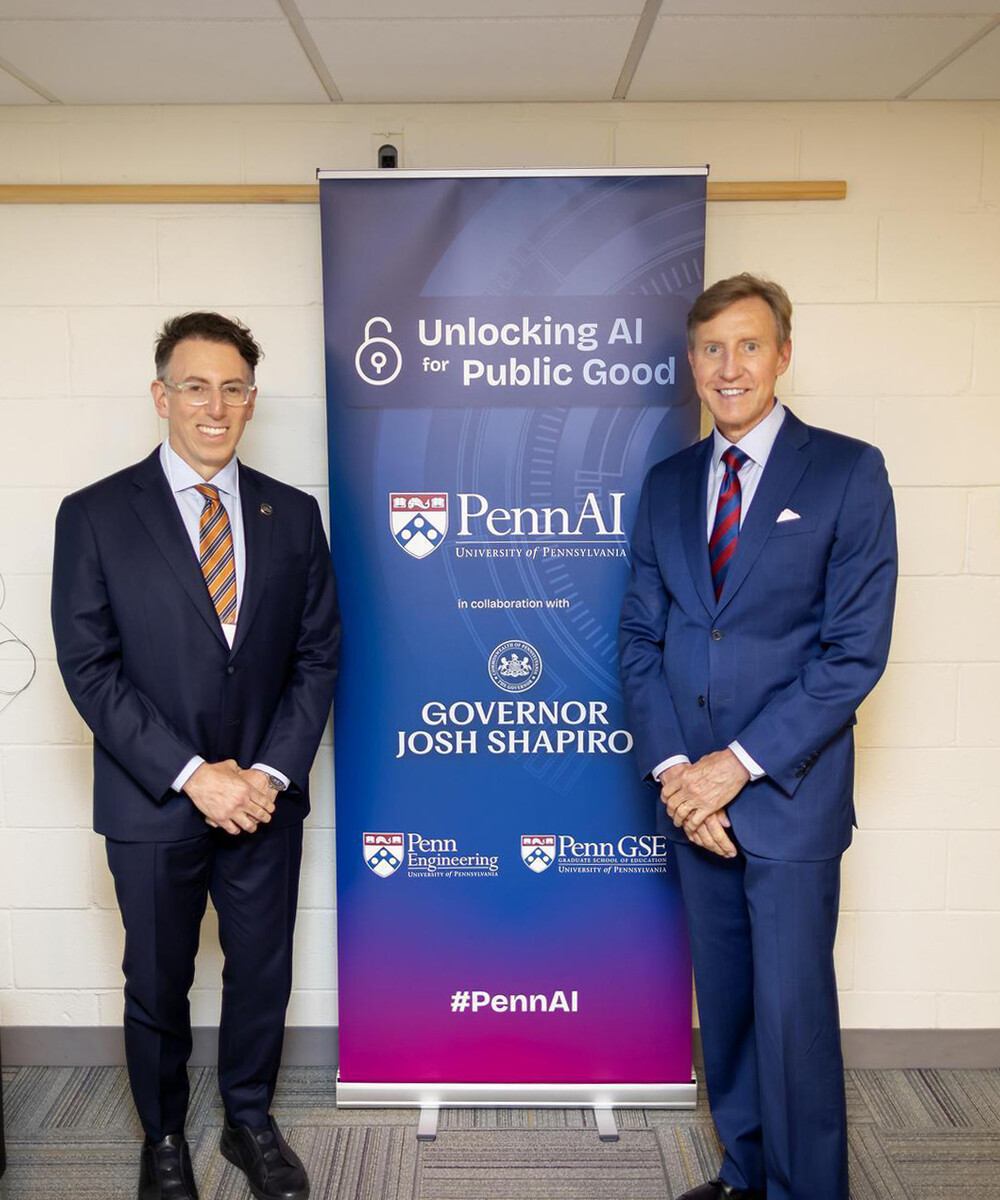
(From left) Doctoral student Hannah Yamagata, research assistant professor Kushol Gupta, and postdoctoral fellow Marshall Padilla holding 3D-printed models of nanoparticles.
(Image: Bella Ciervo)
2 min. read

The University of Pennsylvania and Pennsylvania Governor Josh Shapiro’s Office of Administration have signed a cooperative agreement for artificial intelligence advising services. The agreement leverages Penn’s faculty experts and leadership to support AI policy and provide the Commonwealth with expertise related to AI organizational strategy, risk assessment, and governance.
Penn President J. Larry Jameson, who was joined by Pennsylvania’s Chief Transformation Officer Ben Kirshner, announced the agreement at “Unlocking AI for Public Good,” a daylong summit hosted by the University of Pennsylvania and Governor Shapiro’s Office convening Penn leaders and experts; public sector leaders from the state, county, and local government levels; and labor partners, policy makers, and colleagues from industry.
“Pennsylvania is leading the way in this new era of artificial intelligence—just as we did during the agricultural and industrial revolutions,” said Shapiro. “AI is evolving faster than any technology in decades, and to stay ahead, we’re connecting our world-class research institutions like Penn, our innovative private sector, and our forward-looking state and local governments to harness its power responsibly. This technology is here to stay and by leaning into our strengths—from our skilled workforce and leading energy sector to our world-class universities and research institutions—Pennsylvania is showing the nation how we can use AI to grow our economy, empower workers, and deliver better, faster results for the people we serve.”
“The University of Pennsylvania has proudly served our Commonwealth for nearly 300 years, and this new AI cooperative agreement with Governor Shapiro’s administration builds on that distinction,” said Jameson. “Generative AI is rapidly changing how we work, learn, and innovate. In sharing Penn’s interdisciplinary expertise with Commonwealth policymakers and legislators, we aim to inform AI policies that benefit and protect all Pennsylvanians.”
The University is emerging as a national leader in AI education and research, combining technical excellence in areas such as health care, scientific discovery, and robotics, with a commitment in all disciplines to ethical, human-centered AI. Penn Engineering was the first in the Ivy League to introduce an undergraduate AI major and one of the very first AI undergraduate engineering programs in the United States. Penn’s Graduate School of Education (GSE) also launched the Ivy League’s first-ever AI degree program in education. GSE also initiated PASS, a first-of-its-kind AI professional development program in collaboration with the School District of Philadelphia offered at no cost. The University, in fact, now offers two undergraduate and four graduate degrees with a focus in AI, as well as one concentration and five certificates.
Penn AI, which convened “Unlocking AI for Public Good,” centralizes the University’s groundbreaking interdisciplinary AI research across its 12 Schools and numerous research Centers to elevate Penn’s strengths in AI and data science.
The daylong conference centered around the topic of how AI can improve public services, strengthen communities, and promote equitable growth across Pennsylvania. Kicking off the day, Vijay Kumar, the Nemirovsky Family Dean in the School of Engineering and Applied Science and Dean Katharine O. Strunk of the Graduate School of Education joined Pennsylvania’s Secretary of Administration Neil Weaver in welcoming participants. Keynote speakers and experts from eight schools offered ideas on how to apply AI in banking, criminal justice, education, health care, and human services to guide evidence-based policy.
The cooperative agreement for AI advising services between the University of Pennsylvania and the Governor’s Office of Administration will provide greater leverage and smoother access for the Commonwealth to tap into Penn’s research, knowledge, and expertise.

(From left) Doctoral student Hannah Yamagata, research assistant professor Kushol Gupta, and postdoctoral fellow Marshall Padilla holding 3D-printed models of nanoparticles.
(Image: Bella Ciervo)

Jin Liu, Penn’s newest economics faculty member, specializes in international trade.
nocred

nocred

nocred